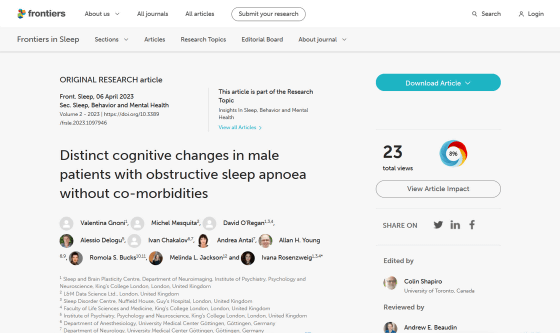Research confirms that sleep apnea syndrome, which stops breathing while sleeping, causes cognitive function to decline

Sleep apnea, which causes repeated pauses and shallow
Frontiers | Distinct cognitive changes in male patients with obstructive sleep apnea without co-morbidities
https://doi.org/10.3389/frsle.2023.1097946

Obstructive sleep apnea may directly cause ea | EurekAlert!
https://www.eurekalert.org/news-releases/985009
For The First Time, Sleep Apnea Is Shown To Cause Cognitive Decline : ScienceAlert
https://www.sciencealert.com/for-the-first-time-sleep-apnea-is-shown-to-cause-cognitive-decline
People who are obese or have a small lower jaw have a narrow upper airway, which is the passageway for breathing, and may become completely blocked due to factors such as the relaxation of the throat muscles during sleep. If this results in frequent and complete cessation of breathing during sleep, it is diagnosed as obstructive sleep apnea.
Common symptoms of obstructive sleep apnea include loud snoring, frequent awakenings during sleep, daytime sleepiness, and experiencing long headaches in the morning. Major risk factors include being middle-aged and older, obesity, smoking habits, chronic nasal congestion, high blood pressure, and being male. It is estimated that 15-30% of men and 10-15% of women suffer from obstructive sleep apnea worldwide, but many patients are undiagnosed.
In addition, it has long been pointed out that obstructive sleep apnea is associated with cognitive problems , mental health problems such as depression , and neurodegenerative diseases such as Alzheimer's disease . However, it was unclear whether these illnesses were caused by obstructive sleep apnea or medical problems associated with obstructive sleep apnea.

A new research team in the United Kingdom, Germany, Australia, etc., has 27 male subjects aged 35 to 70 who suffer from obstructive sleep apnea but do not have comorbidities, and their age and body mass index (BMI). The study was conducted on 7 male subjects who were matched but did not have obstructive sleep apnea. The research team investigated the severity of obstructive sleep apnea in each subject by
Importantly in this study, the subjects diagnosed with obstructive sleep apnea had no comorbidities. Many people with obstructive sleep apnea have comorbidities such as cardiovascular disease, metabolic disease, stroke, diabetes, chronic systemic inflammation, depression, and other health conditions during obstructive sleep. Apnea patients are rare.
As a result of the experiment, it was found that subjects suffering from obstructive sleep apnea had lower scores in sustained attention, executive function , short-term visual recognition memory, and social and emotional awareness compared to controls. In addition, the results showed that the more severe the obstructive sleep apnea, the worse the score compared to the control group.
'In men with obstructive sleep apnea, executive function and visuospatial memory are impaired, and alertness and visuospatial memory are impaired,' said study team member Ivana Rosenzweig, a psychiatrist at King's College London , UK. Impairments in sustained attention, psychomotor and impulse control have been shown, most of which were traditionally attributed to comorbidities. 'This is the first time we have shown that schizophrenia causes significant impairment in social cognition.'

In this study, it is not clear what mechanism obstructive sleep apnea causes cognitive decline. However, the research team believes that a decrease in blood oxygen concentration, an increase in carbon dioxide concentration, and a decrease in sleep quality due to the cessation of breathing may be involved.
'These complex interactions are not yet fully understood,' says Rosenzweig, 'but they lead to widespread neuroanatomical and structural changes in the brain, such as low blood oxygen levels, and associated functional changes.' 'While our study is a proof of concept, comorbidities are likely to exacerbate and perpetuate the cognitive impairment resulting from obstructive sleep apnea.' suggests that,' he said.
Related Posts:
in Science, Posted by log1h_ik







